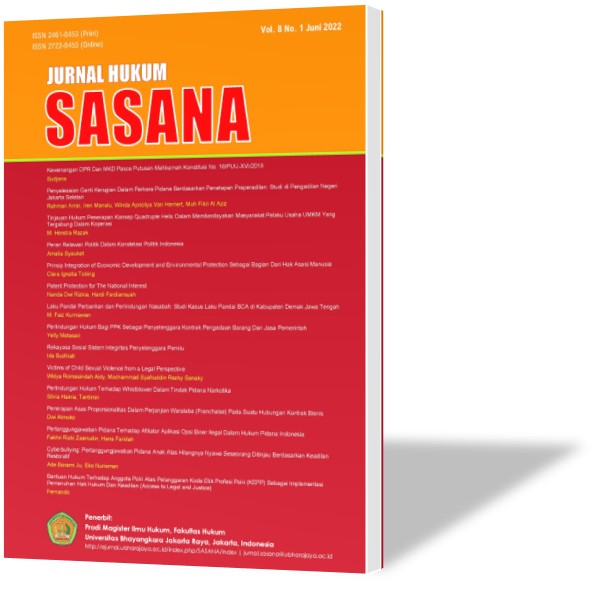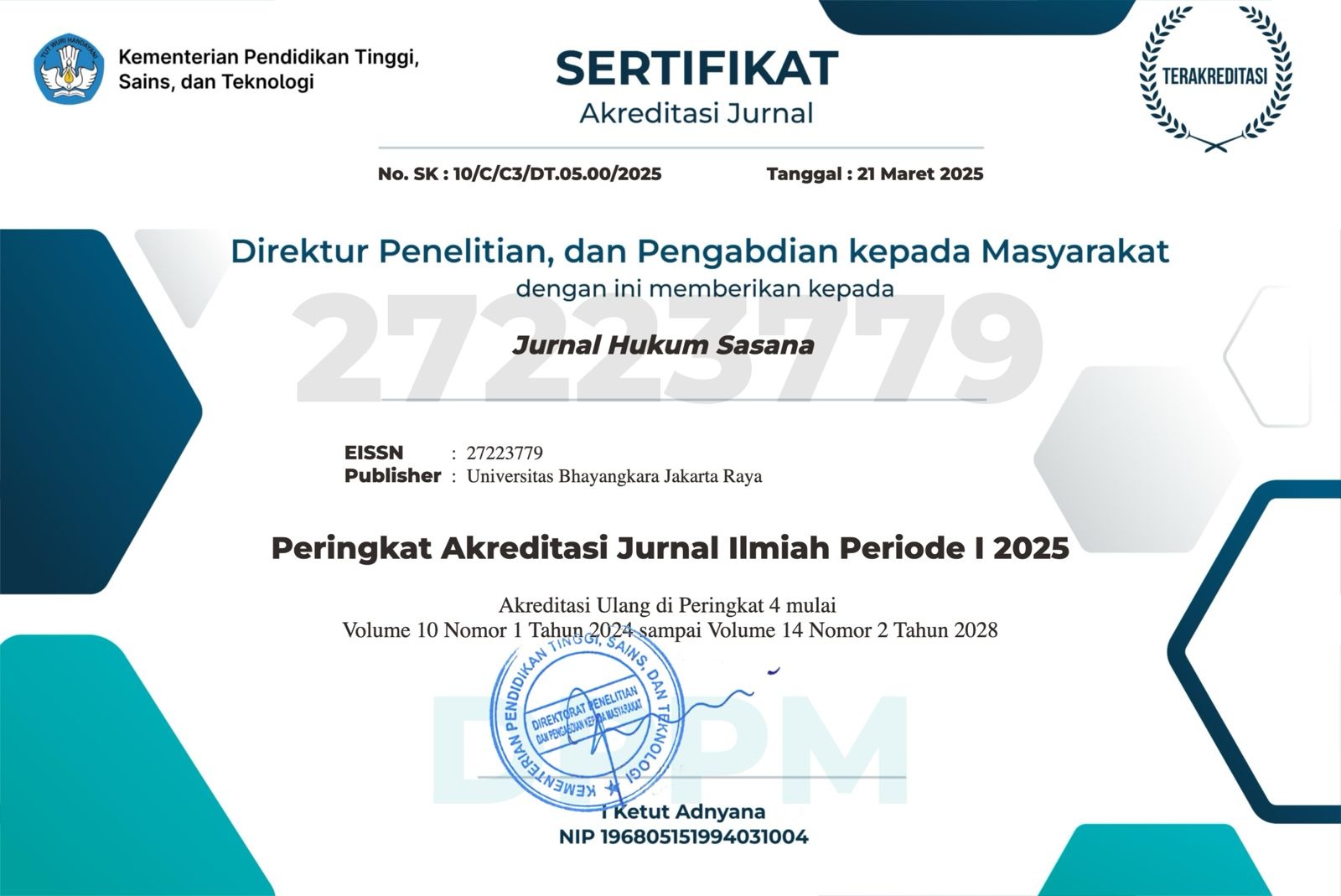Dampak Fintech Illegal dan Penegakan Hukumnya di Indonesia
DOI:
https://doi.org/10.31599/sasana.v9i1.1358Keywords:
law enforcement, illegal fintechAbstract
Fintech, short for financial technology, has brought significant changes to the way we conduct financial transactions, access financial services, and manage personal finances. However, the rapid growth of Fintech has also created opportunities for illegal practices in this sector. In this abstract, we will discuss the impact of illegal Fintech on the economic level of society. Illegal fintech refers to illegal practices carried out by companies or individuals operating in the Fintech sector without proper permits or regulation. The negative impact of illegal Fintech can be seen from several perspectives. Illegal practices within the Fintech sector can have a negative impact on the economy as a whole. This can reduce public confidence in the Fintech industry in general and hinder the growth of sectors that actually have great potential to support economic development. Illegal fintech often targets people who do not have adequate access to formal financial services. As a result, already vulnerable communities may become targets of these illegal practices and face higher risks of exploitation and fraud. To overcome the impact of illegal Fintech on the economic level of society, several actions can be taken including; The government needs to improve the regulatory framework and supervision of the Fintech sector to reduce illegal practices. Fintech companies must be granted proper licenses and closely monitored to ensure compliance with applicable regulations. Public education and awareness about the risks of illegal Fintech is very important. The public needs to be provided with sufficient information on how to identify illegal Fintech and report it to the competent authorities.
Downloads
References
JURNAL HUKUM SASANA | Volume 9 Number 1, June 2023
Martinus Ahmad, Ahmad Abdul Ghoni, Sri Wahyuni 167
DAFTAR PUSTAKA
Abdullah, A. (2021). Analisis Pengetahuan Pinjaman Online Pada Masyarakat Surakarta. JESI (Jurnal Ekonomi Syariah Indonesia), 11(2), 108-114.
Andaiyani, S., Yunisvita, Y., & Tarmizi, N. (2020). Peran Financial Technology sebagai Alternatif Permodalan bagi UMKM di Desa Kerinjing, Kabupaten Ogan Ilir. Sricommerce: Journal of Sriwijaya Community Services, 1(2), 85-92.
Disemadi, H. S. (2021). Fenomena Predatory Lending: Suatu Kajian Penyelenggaraan Bisnis Fintech P2P Lending selama Pandemi COVID-19 di Indonesia. Pandecta Research Law Journal, 16(1), 55-67.
Fachrurrazy, M., & Siliwadi, D. N. (2020). Regulasi Dan Pengawasan Fintech Di Indonesia: Persfektif Hukum Ekonomi Syariah. AL-SYAKHSHIYYAH Jurnal Hukum Keluarga Islam dan Kemanusiaan, 2(2), 154-171.
Khofsoh, F. Z., Setyaningrum, L. I., Saphira, A., Grace, P. A., & Parasetya, M. T. (2022). Pengaruh Etika Sosial Terhadap Antisipasi Fintech Lending Ilegal. JDEP (Jurnal Dinamika Ekonomi Pembangunan), 5(1), 11-17.
Maulana, Y., & Wiharno, H. (2022). Fintech P2P Lending dan Pengaruhnya Terhadap Pertumbuhan Ekonomi Indonesia. Indonesian Journal of Strategic Management, 5(1).
Mauliza, A. Y. I., Machmudi, R. D. S., & Indrarini, R. (2022). Pengaruh Perlindungan Data Dan Cyber Security Terhadap Tingkat Kepercayaan Menggunakan Fintech Masyarakat Di Surabaya. SIBATIK JOURNAL: Jurnal Ilmiah Bidang Sosial, Ekonomi, Budaya, Teknologi, dan Pendidikan, 1(11), 2497-2516.
Novika, F., & Septivani, N. (2022). Pinjaman Online Ilegal Menjadi Bencana Sosial Bagi Generasi Milenial. Management Studies and Entrepreneurship Journal (MSEJ), 3(3), 1174-1192.
Purwanto, H., Yandri, D., & Yoga, M. P. (2022). Perkembangan dan Dampak Financial Technology (Fintech) Terhadap Perilaku Manajemen Keuangan di Masyarakat. Kompleksitas: Jurnal Ilmiah Manajemen, Organisasi Dan Bisnis, 11(1), 80-91.
Rachmawati, A., & Yudhawati, D. (2022). Gaya Kognitif Konsumen Pada Fintech Peer To Peer Lending Terhadap Literasi Keuangan. Psycho Idea, 20(2), 128-140.
Wahyuni, R. A. E., & Turisno, B. E. (2019). Praktik Finansial Teknologi Ilegal Dalam Bentuk Pinjaman Online Ditinjau Dari Etika Bisnis. Jurnal Pembangunan Hukum Indonesia, 1(3), 379-391.
Downloads
Published
Issue
Section
License

This work is licensed under a Creative Commons Attribution-NonCommercial 4.0 International License.













_-_Copy1.jpg)




